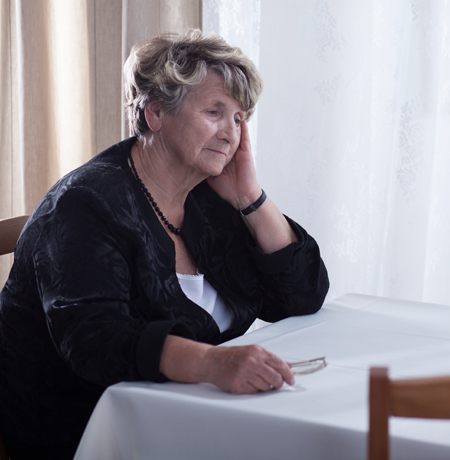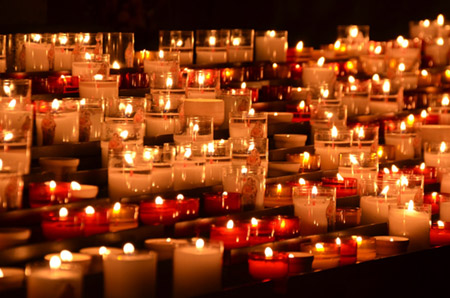 Has The Loss Of A Loved One Created A Void In Your Life?
Has The Loss Of A Loved One Created A Void In Your Life?
Do you find yourself yearning for someone who passed away? Has the grieving process caused a pit in your stomach and a lack of purpose in your life? Does it feel impossible to go about your day without your loved one there?
Maybe all the little things get to you—having to pay the bills and take care of everything around the house all alone. In addition to losing your loved one, you may feel like you’ve lost yourself. So much of your identity revolved around your life together that now you struggle to figure out who you are without the other person. For the first time in ages, you may ask yourself: What do I like to do? What are my true values and interests? Who even am I?
You May Feel Unable To Move On From Your Loss—Even Though Other People Have
When you first lose a loved one, you may feel overwhelmed with all the outpouring of love and support. But once people have stopped giving you flowers and sympathy cards, things could get even harder. While everyone else seems to have moved on from your loved one’s passing, you can’t seem to do the same. You may even feel a sense of shame, like you should be “over it” by now.
Grieving is a confusing and complicated process. No one should have to work through it alone. Here at Heart & Mind Counseling, our goal is to support you as you process your grief and help you construct a new sense of identity in the wake of your loss.
There Is No Right Or Wrong Way To Mourn
Grief affects everyone differently. There is no “proper” way to mourn the loss of someone close to us and no timeframe for how long it takes. Sadly, our society puts so much pressure on us to grieve quickly—we’re expected to spend a month or so in mourning and then go back to work and resume our social lives.
There are so many unwritten rules about supporting a grieving person. For the first 30 days after your loss, the cultural norm is that people go out of their way to shower love and compassion on you. Then afterward, they will hesitate to bring up your loss because they don’t want to trigger unpleasant thoughts or prolong your grief. While they may do this out of respect, it often makes matters worse.
After all, the hardest part of the grieving process usually happens right after the first 30 days. It’s at this point that the sense of loss really sinks in, because you don’t have people calling you all the time or cooking meals for you. You don’t have as many distractions from your thoughts and feelings.
This is why grief therapy is so important. Once all the funerary rites have been performed and all the sympathy cards have stopped coming in the mail, there’s a lot of emotion to work through. We’re here to help you navigate this difficult chapter of your life.
 Grief Counseling Is About Moving Forward, Not Moving On From Your Loved One
Grief Counseling Is About Moving Forward, Not Moving On From Your Loved One
In the wake of your loss, part of you may want to move on, and another part may worry that doing so will dishonor the memory of your loved one. In fact, you may be afraid of going back to normal life because you don’t want to forget them.
Your grief counselor will help you work through these complex feelings. Instead of moving on, you will learn to move forward. Moving forward can help you recognize the finality of your loved one’s passing, making it easier to avoid questions of what you could’ve done better for them. The goal is to help you create a new life for yourself while still holding their memory dear.
What To Expect In Bereavement Counseling Sessions
Grief counseling provides a space to tell stories about your loved one, no matter how long ago they happened and how many times you’ve told them before. There is no shame here. You can laugh, cry, vent, and share whatever emotions you want. No one is going to tell you that you should be “over” your loss by now. We want you to feel all your feelings, sit with them, and let yourself heal at your own pace.
At the same time, grief counseling with us is also about forging a new life for yourself. We are highly solution-focused. What is the hardest part about the grieving process for you? If you lost a partner or spouse, what are your thoughts on dating again? What are some hobbies and activities you enjoy by yourself? How can you prepare yourself for birthdays, holidays, and anniversaries without your loved one? Answering these questions will give you a clearer picture of your future and prepare you for times when you feel most vulnerable.
Tailoring Your Treatment Plan
Since no one grieves the same way, therapy looks different for each client. Some of the main approaches we draw from include CBT (Cognitive Behavioral Therapy) and EMDR (Eye Movement Desensitization and Reprocessing).
CBT can help you reframe some of the negative beliefs that often arise after a loss. Maybe you feel mad at God or even the person who passed away. Or perhaps you find yourself playing the “woulda, coulda, shoulda” game—you feel like you could’ve done more for the person in life. Through CBT, you can learn to question these beliefs and engage in more positive self-talk.
EMDR is a trauma-focused approach to therapy that can help you process and resolve your grief. If you’re having trouble verbalizing your feelings after your loss, EMDR is the ideal approach. It allows your brain to process grief using a series of gentle, nonverbal stimulation exercises.
No matter what approach you choose, we are confident that we can help you weather this painful time. It is possible to move forward in life and still hold onto fond memories of your loved one. We’re here to show you how.
You May Have Some Concerns About Grief Counseling…
I feel like I should be doing better by now. Is there something wrong with me?
There is nothing wrong with you! It’s perfectly normal to grieve for longer than expected. After all, grief makes you more vulnerable and often brings old emotional wounds to the surface. Maybe a breakup happened around the time of your loss and that compounded your grief. Or perhaps there is unresolved trauma that’s affecting you again. Counseling can help you process the issues in your life that make bereavement extra hard for you.
I’m worried that therapy will make me forget about my loved one.
Therapy is not about forgetting or letting go of your loved one. Together, we will find rituals, activities, and linking objects that serve as a pleasant reminder of them. This way, you will hold their memory dear even as you move forward in life.
 I feel like I’m fine as long as I’m busy.
I feel like I’m fine as long as I’m busy.
Believe it or not, filling your days with activities is still grieving. If you’re always on the go and making sure your days are busy, it could be a sign that you’re avoiding your feelings. Your need to distract yourself may be a way of coping with your loss. Counseling can help you process your feelings so that you can address them sooner rather than later.
You Don’t Have To Grieve In Silence
Nothing in life is harder than grief. You deserve a place where you can sit with all your emotions without any fear of being dismissed or invalidated. Here at Heart & Mind Counseling, we want to provide that. To get started, you can email us or call 707-815-0374 for a free, 15-minute phone consultation.
Blog Posts Coming Soon
Do you have the Holiday Blues or Depression?
It's the holiday season and while it's supposed to be a festive time for family and friends, for many, it is not. It is a time of sadness and even depression. Are Holiday Blues for Real? Yes! The Holiday Season does not necessarily cause mental health issues, but the...
Benefits of a Health Savings Account (HSA) & How to Use It
With open enrollment for many companies offering Health insurance in full-swing right now, and with those with deductibles re-setting in January, now is a GREAT TIME to consider using or adding a high deductible health plan (HDHP) choice and a Health Savings Account...
CBT and CPT – Real Help for Trauma
Trauma Focused Cognitive Behavioral Therapy (TF-CBT) Designed to help Children and their Parents What Is Trauma? Trauma can be the result of many types of events: sexual abuse, grief, domestic abuse or any type of violence, military combat, auto accidents, natural...


 Has The Loss Of A Loved One Created A Void In Your Life?
Has The Loss Of A Loved One Created A Void In Your Life?  Grief Counseling Is About Moving Forward, Not Moving On From Your Loved One
Grief Counseling Is About Moving Forward, Not Moving On From Your Loved One I feel like I’m fine as long as I’m busy.
I feel like I’m fine as long as I’m busy.

